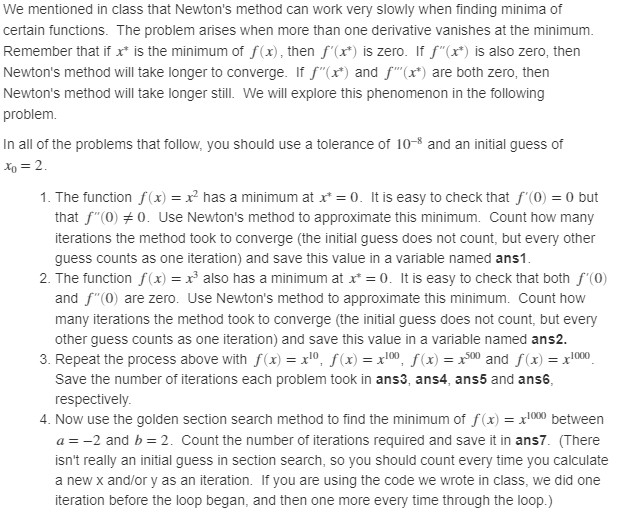Answered step by step
Verified Expert Solution
Question
1 Approved Answer
MATLAB ONLY We mentioned in class that Newton's method can work very slowly when finding minima of certain functions. The problem arises when more than
MATLAB ONLY

We mentioned in class that Newton's method can work very slowly when finding minima of certain functions. The problem arises when more than one derivative vanishes at the minimum Remember that if r* is the minimum of f(x), then f'(x*) is zero. If F"(x*) is also zero, then Newton's method will take longer to converge. If f"(x*) and f'(x*) are both zero, then Newton's method will take longer still. We will explore this phenomenon in the following problem In all of the problems that follow, you should use a tolerance of 10-8 and an initial guess of X = 2. 1. The function f(x) = x2 has a minimum at r* = 0. It is easy to check that f'(0 = 0 but that f"0 +0. Use Newton's method to approximate this minimum. Count how many iterations the method took to converge (the initial guess does not count, but every other guess counts as one iteration) and save this value in a variable named ans1 2. The function f(x) = r also has a minimum at x* = 0. It is easy to check that both f'(0 and "0) are zero. Use Newton's method to approximate this minimum. Count how many iterations the method took to converge (the initial guess does not count, but every other guess counts as one iteration) and save this value in a variable named ans2. 3. Repeat the process above with f (x) = xlo f (x) = x100 S (x) = 2500 and f(x) = x1000 Save the number of iterations each problem took in ans3, ans4, ans5 and ans6, respectively 4. Now use the golden section search method to find the minimum of f(x) = x1000 between a=-2 and b= 2. Count the number of iterations required and save it in ans7. (There isn't really an initial guess in section search, so you should count every time you calculate a new x and/or y as an iteration. If you are using the code we wrote in class, we did one iteration before the loop began, and then one more every time through the loop.) We mentioned in class that Newton's method can work very slowly when finding minima of certain functions. The problem arises when more than one derivative vanishes at the minimum Remember that if r* is the minimum of f(x), then f'(x*) is zero. If F"(x*) is also zero, then Newton's method will take longer to converge. If f"(x*) and f'(x*) are both zero, then Newton's method will take longer still. We will explore this phenomenon in the following problem In all of the problems that follow, you should use a tolerance of 10-8 and an initial guess of X = 2. 1. The function f(x) = x2 has a minimum at r* = 0. It is easy to check that f'(0 = 0 but that f"0 +0. Use Newton's method to approximate this minimum. Count how many iterations the method took to converge (the initial guess does not count, but every other guess counts as one iteration) and save this value in a variable named ans1 2. The function f(x) = r also has a minimum at x* = 0. It is easy to check that both f'(0 and "0) are zero. Use Newton's method to approximate this minimum. Count how many iterations the method took to converge (the initial guess does not count, but every other guess counts as one iteration) and save this value in a variable named ans2. 3. Repeat the process above with f (x) = xlo f (x) = x100 S (x) = 2500 and f(x) = x1000 Save the number of iterations each problem took in ans3, ans4, ans5 and ans6, respectively 4. Now use the golden section search method to find the minimum of f(x) = x1000 between a=-2 and b= 2. Count the number of iterations required and save it in ans7. (There isn't really an initial guess in section search, so you should count every time you calculate a new x and/or y as an iteration. If you are using the code we wrote in class, we did one iteration before the loop began, and then one more every time through the loop.)
Step by Step Solution
There are 3 Steps involved in it
Step: 1

Get Instant Access to Expert-Tailored Solutions
See step-by-step solutions with expert insights and AI powered tools for academic success
Step: 2

Step: 3

Ace Your Homework with AI
Get the answers you need in no time with our AI-driven, step-by-step assistance
Get Started


